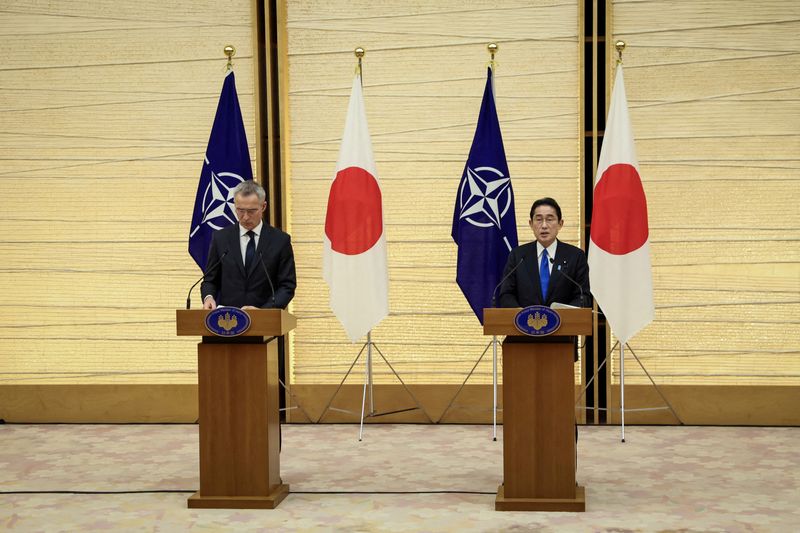By Sakura Murakami and Tim Kelly
TOKYO (Reuters) -Japanese Prime Minister Fumio Kishida will join NATO leaders in Lithuania on Tuesday to remind an alliance focused on Ukraine to pay heed to Chinese and Russian activity in Asia, which Japan sees as a threat to global security.
Kishida’s second visit to a North Atlantic Treaty Organization gathering, along with the leaders of South Korea, Australia and New Zealand, comes as Japan doubles defence spending to deter Chinese and Russian forces in the waters and skies around Japan.
With Japan feeling it can no longer solely rely on its old ally the U.S. to back it up, Kishida is also courting new security partners.
"Japan talks about principles such as territorial integrity, but the message to Europe is 'don’t forget about the Indo-Pacific, no matter how difficult the situation with Russia is'," said Michito Tsuruoka, a NATO expert at Keio University.
In its most recent annual national security assessment, Japan said it was surrounded by nuclear-armed actors, including China, North Korea and Russia, which is also a neighbour to six NATO members. Tokyo worries about getting sucked into a conflict over Taiwan, which is only 100 km (62 miles) away.
Kishida, who has embraced the U.S. rhetoric of "like-minded nations" sticking together, has for the past year warned that a Ukraine-like conflict, which Russia describes as a special operation, could erupt in East Asia if China tries to take control of self-ruled Taiwan. China has criticised Japan for a "Cold War mentality".
By working with NATO, Japan could also help the U.S. knit its global alliances together, "breaking down the traditional silos between America's Atlantic allies and America's Pacific allies", the U.S. ambassador to NATO, Julianne Smith, told a media briefing.
"We find ourselves coming together to address a whole range of options," she said.
'BIG MISTAKE'
At the meeting in Lithuania's capital, Vilnius, Japan is expected to be included in NATO's Individually Tailored Partnership Program, opening the way for cooperation on cyber security, space and information sharing on China and Russia.
That initiative follows a visit to Japan by NATO Secretary General Jens Stoltenberg in January when he said the lessons China was learning from Ukraine could influence its decisions.
NATO documents have begun to reflect concern about China, East Asia and the Indo-Pacific, but Japan needs to deepen its awareness of those issues, a Japanese official involved in discussions about NATO ties said.
However, the military alliance is unlikely to agree to open an office in Tokyo in the face of French President Emmanuel Macron's opposition to a move that could irritate China and open NATO up to accusations of geographical overreach.
"If we push NATO's presence in the Indo-Pacific area and expand its reach, we will be making a big mistake," a French foreign ministry spokesperson said.
Diplomats from two European NATO countries who spoke to Reuters said European unease about a Tokyo office went beyond France. They declined to be identified.
Another Japanese official involved in preparations for Kishida's NATO visit said the idea of a NATO office in Japan had nothing to do with China, but that is how it became framed, and each NATO country has its own relations with China.
Japan, he added, would continue communicating with NATO through its embassy in Brussels or via the Danish embassy in Tokyo, the contact point in Japan for dealings with the military alliance.
SEOUL AND SYDNEY
South Korean President Yoon Suk Yeol, who will also attend the NATO summit, is also looking to deepen relations in Europe including new defence deals with countries like Poland.
Under Yoon, South Korea has set up a liaison office with NATO in Brussels and has embraced a call for unity among like-minded countries. He may, however, face renewed pressure to provide weapons to Ukraine, which his administration has declined to do, wary of Russian influence over North Korea.

Australian Prime Minister Anthony Albanese, another member of Asia Pacific Four invited to the NATO gathering, said Australia would maintain support for Ukraine, when asked about new financial aid for it.
"We’ll continue to stand with the people of Ukraine," Albanese told Sky News.